Guest Blogger Tapuwa Ayeh
Like many women, I have always wanted to be a mother and motherhood was supposed to be part of my life journey. Well life is not always going to be what you planned. For years, I went through a painful emotional journey of trying to get pregnant, and alas, failing [...]]]>
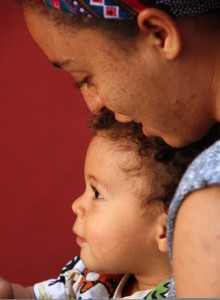
Not everyone is able to have a biological child. Credit: Kirstin Paliza/IPS
Guest Blogger Tapuwa Ayeh
Like many women, I have always wanted to be a mother and motherhood was supposed to be part of my life journey. Well life is not always going to be what you planned. For years, I went through a painful emotional journey of trying to get pregnant, and alas, failing at every attempt.
Getting pregnant should be easy, right? I am married to a wonderful person and we felt the only thing left to make us complete was to start a family. For years, we worked on getting pregnant. Every month, being hopeful, every month, disappointment, and then guilt. Back to the tests, other alternatives, but nothing worked.
I mean, is this not my purpose in life as a woman. If I can’t bear children then what is my purpose? The initial feeling of failure that comes from not being able to perform life’s most basic task, reproduction, becomes overwhelming. I start questioning. How could this have happened to us? What’s wrong with me? What have I done wrong? Did I wait too long?
With the guilt comes the worst feeling of all. I started feeling isolated from the community of women who have children as I cannot engage in their conversations about children. In the meantime, there seemed to be an explosion of babies around me. Everyone was having babies, and there were baby showers to attend.
While I am very happy for those having babies, I can’t help the feelings of sadness and resentment as to why can’t it be me. I started begrudging others for being able to get pregnant so quickly and easily. At the same time, enduring those “when are you having babies, it’s about time you start a family,” comments and not knowing how to respond without getting emotional because I am not ready to share this very personal information with most, except for family and a few close friends.
Support from family and friends became very important. I am very blessed to have an amazing wonderful supportive family! My poor husband who had to go through the emotional strain I was putting him through coped in his own way. Through it all, we have become even closer. My parents and siblings have been there to give me emotional support and to let me know it is okay. My girlfriends have been there for me as well. I am very blessed as I have beautiful nieces and nephews who I dearly love.
Now I know that not having children does not make me less of a woman or a person and this has been a very important revelation for me. I have also come to realize that there are many women going through this and that I am not alone. We have accepted that we are infertile. With acceptance, we are at peace and happy and are now open to other options such as adoption. We know that infertility is not easy, but it isn’t terminal either!
]]>A. When it is shown in a pornographic magazine, film or website.
B. Never.
C. When it is emailed to government officials urging action to improve public health.
One could argue about A and B but this blog is [...]]]>
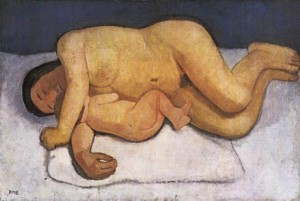
By Paula Modersohn Becker
When is a photo of a woman giving birth considered pornographic? Take your pick:
A. When it is shown in a pornographic magazine, film or website.
B. Never.
C. When it is emailed to government officials urging action to improve public health.
One could argue about A and B but this blog is about C.
Earlier this year, in Zambia, Chansa Kabwela, news editor at the feisty opposition newspaper The Post, was charged with circulating pornography with intent to corrupt public morals. What was her crime? During a nationwide strike by Zambia’s miserably paid doctors, a woman allegedly gave birth without medical assistance in a hospital car park. The baby was in a breech position and later died.
Her family sent Kabwela the photos but she found them too graphic for publication. Instead, she emailed them to the vice-president and other government officials and women’s groups, urging a negotiated end to the strike to avoid more deaths.
President Rupiyah Banda found the photos “morbid and peculiar” and Kabwela, a 29-year-old mother of two, was charged with the porn offence, which carries a five-year jail sentence. The state argued that giving birth is sacred in Zambia and the photos were disrespectful.
If giving birth is so sacred, why was the woman delivering in a car park?
Good sense prevailed and in November a judge acquitted Kabwela.
The Post has long been harassed by government for exposing corruption. This court case is one more instance, using birth, women and tradition as a cover to erode press freedom.
A very famous Christmas birth
This being the season of a famous birth, on the other side of the world, in New Zealand, a mischievous billboard about the immaculate conception has angered Catholics. 
It shows Joseph and Mary in bed. She looks blissful; he looks dejected. The kicker: “Poor Joseph. God is a hard act to follow.”
The twist is that the originator is an Anglican archdeacon who commissioned an ad agency to produce a Christmas poster. The archdeacon argues, somewhat confusedly, that the purpose was to highlight that Christmas is about love, not about Mary’s impregnation by God.
Within hours the billboard was defaced with brown paint. Well, at least this is better than rioting over caricatures of the Prophet or charging an editor with pornography.
Giving birth is charged with cultural meaning: it can be sacred, pornographic, joyful, “eculiar” or offensive. For half a million women, every year, it is deadly.
Yet these deaths do not spark the same outrage as a billboard or photographs.
My wish this Christmas is quite simple: safe delivery for women everywhere, not in a car park and not in a manger, neither holy nor unholy, whether through sex, artificial insemination or immaculate conception. Just safe.
***
Read about why maternal mortality remains so intractable here and about midwives in India.
]]>In Paris, the Chilean researcher, novelist and feminist Ana (Nicha) Vazquez Bronfman had died, aged 71. She was a beacon for a generation of Latin American women for her insights on identity and gender. One [...]]]>
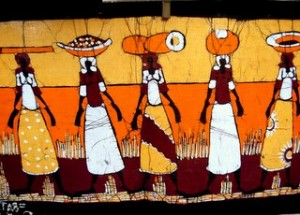
Motherhood, sisterhood, friendship.
In Paris, the Chilean researcher, novelist and feminist Ana (Nicha) Vazquez Bronfman had died, aged 71. She was a beacon for a generation of Latin American women for her insights on identity and gender. One concept she elaborated specially was “transculturation” – the permanent construction of identities in this world of global migration. In 2006 she wrote superbly about sexuality among the elderly – transgressions and secrets, she called it.
In Rome, my friend and fellow journalist Paola Rolletta underwent the next to last chemotherapy session against breast cancer. She was jubilant to see the end of the chemical bombardment. Like antiretrovirals, chemo saves lives but is no picnic.
So, in three hours, youth, disease, health and death touched me. Motherhood and friendship. Joy and sorrow.
Email has made this vertigo possible. News travel quickly and straight to our screens, to our hearts and minds.
News from friends
These days, breast cancer appears more frequently in news from friends.
One in the Dominican Republic and another in Mozambique finished their chemo last year. Paola is finishing hers in February. In Pretoria, where I live, another friend had her second chemo last Friday.
We had lunch together today and wondered if there is more breast cancer among women now than 50 years ago, or better detection. If the rates are higher, why? Lifestyle, fast food, stress, radiation from microwaves, cellphones and all the gadgets that crowd our life?
The Harvard School of Public Health estimates that the poor will account for more than 55 percent of breast cancer deaths this year. Read a very informative story on growing cancer rates among women in the developing world here.
A recent article in the New England Journal of Medicine argues that “western” influences such as changes in diet, less exercise, delayed childbirth, families with fewer children, less breast feeding, and hormone replacement therapy are all thought to increase the risk of breast cancer for women in low-income countries.
The good news is that breast cancer, like AIDS, is becoming less and less lethal, if detected and treated early.
I am so proud of my cancer-survivor friends. They have worn their baldness as a badge of courage and have acquired new wisdom.
And while we age and think about breast cancer, a younger generation moves closer to adulthood.
I wondered how to name and save this rambling text in my laptop. And I wrote – BLOG: LIFE.
]]>This was not an ordinary polio vaccination day for the children of Babile and Kombolcha, small towns about 500 km East of Addis Ababa. Ferenjis (foreigners in Amharic) [...]]]>
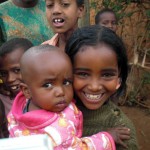
By Gifti Nadi
This was not an ordinary polio vaccination day for the children of Babile and Kombolcha, small towns about 500 km East of Addis Ababa. Ferenjis (foreigners in Amharic) had arrived!
About 100 Rotarians from the USA and Canada paid their way to Harar and Dire Dawa in Eastern Ethiopia to join local health workers in a massive drive to vaccinate 11.5 million children under five nationwide.
In recent years, 24 cases of polio have been detected in Ethiopia, likely coming from Sudan, says the World Health Organisation.
We travelled in small groups to the towns nestled against the backdrop of stunning mountains. We went door to door and were warmly welcomed by the primarily Muslim, Oromo and Somali families.
Last year, a survey showed that 70 per cent of mothers know about polio’s dreadful consequences and the benefits of vaccination, thanks to the work of dedicated community health workers.
Still, some believe that the vaccine might hurt the kids, so it was good to see the women coming forward.
Away from kitchen and kids
Note the word – women. It was 100 per cent women who brought their kids for vaccination, with the exception of one helpful young man. When a woman lied about not having any children, he convinced her to bring her kid out.
Otherwise, the men were either invisible (out in the town) or chilling out chewing chat (a mild narcotic that is legal), away from women, kitchen and kids.
Only once, in a mostly Somali village, a couple of older men came and asked us what we were doing. Just the Ferenjis in yellow shirts made them curious, I think.
Cheers for the women! They knew what the two little drops meant – a life free of polio for their children. One by one, they brought out their charming little ones while we took turns giving them the drops.
This never took place without a fight. Screams of terror and attempts to escape and spit out the drops were common, a natural reaction to being suddenly bombarded by strangers in yellow shirts.
The pictures tell all. Those under the age of 4 have a suspicious frown while their older siblings smile widely.
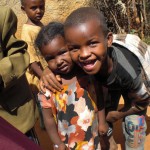
By Gifti Nadi
As we moved from home to home, the crowd grew larger. The playful kids practiced their English, held our hands and warmed our hearts. This was surely a life changing experience and a first for many on this trip.
I was blown away by the dedication and contagious spirit of mothers, community health workers and Rotarians. It was an honor to play a part in a global initiative to eradicate polio from this earth.
*The polio vaccination drive is part of a US$200 million Rotary International Campaign and matching pledges of US$355 from the Bill and Melinda Gates Foundation.
]]>I was very pregnant and very happy. I lived in Rome, Italy, and I wanted a home birth.
I wanted music, soft light, friends, baby on my [...]]]>

Safe motherhood for all. By F. Beaumont.
My daughter Esmeralda turns 18 today. Like all parents, I am amazed at how time flies. Like all mothers, I get reminiscent about those days, 18 years ago.
I was very pregnant and very happy. I lived in Rome, Italy, and I wanted a home birth.
I wanted music, soft light, friends, baby on my stomach still attached by umbilical cord, no drugs, and no epidural. A birth by my own rules, not by a cold hospital’s.
I found a group specialized in home births – Il Melograno. Their package included ob-gyn and midwife, courses, support and, more importantly, a woman-friendly feel. A photographer from Marie Claire magazine would do a photo reportage on my happy home birth.
Our premise: pregnancy is neither a disease nor a disability. Pregnancy and birth have become over-medicalized; women should reclaim it from doctors overly fond of control and caesareans. My family, my colleagues and the baby’s father thought I was crazy. Home births are more common now but women still battle to extricate pregnancy and birth out of the hospital realm.
In Brazil, we recently lost a battle for a centre for natural birth in Rio de Janeiro.
Clueless mommy
In my case, at midnight, after 30 hours of labour, I was stuck at 6 cms dilatation – and exhausted. A home birth must be 100 percent natural, so the few drops of oxitocyn to trigger full dilation had to be administered in hospital, three blocks away. There I went. At 2am my daughter was born – and promptly taken away to the nursery.
At 5:30am a nurse literally dumped my baby girl in my arms and left. No instructions on how to feed, nothing. My midwife and friends were coming at 8 am. What to do? I had never been around a newborn. I was like Carrie Bradshaw in Season 2 of Sex and The City – domesticity and motherhood were not part of my landscape.
So there I was, baby on one hand, baby book on the other, trying to figure it out. This is the most ridiculous and pathetic image of modern motherhood, I thought. How did we end here, from birth as a group event to 6 AM loneliness in hospital?
Less than 24 hours later, against hospital rules, I signed waivers absolving doctors of any responsibility and checked myself out.
I went home and turned on the CD player. My daughter’s godmother had been listening to the Rolling Stones: “You can’t always get what you want”. I chuckled.
Two close friends, one in Windhoek and one in London, recently tried a home birth but ended in hospital, just like me. Still, we were happy to go through labour at home.
Meanwhile, many women struggle to have a safe birth – anywhere. About half a million women die in childbirth very year. There are not enough trained midwives to ensure a safe labour, whether at home or at a clinic,

Art by Nelly Romeo Alves, photo by E. Zimbres
At a conference on reproductive health in Berlin last week, the World Health Organisation reported that one woman dies every minute for lack of adequate pregnancy and birth services.
A cruel paradox: the world proffers to revere motherhood but does not make it safe and comfortable for mothers to give birth.
]]>